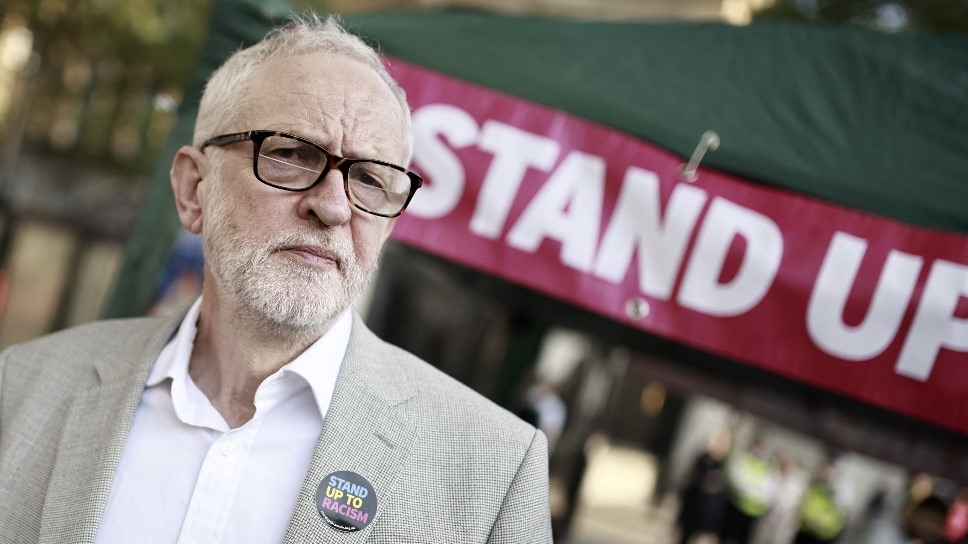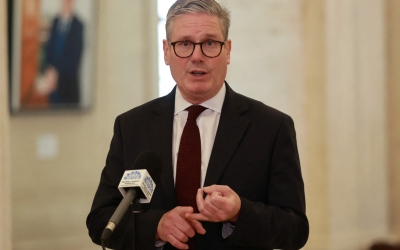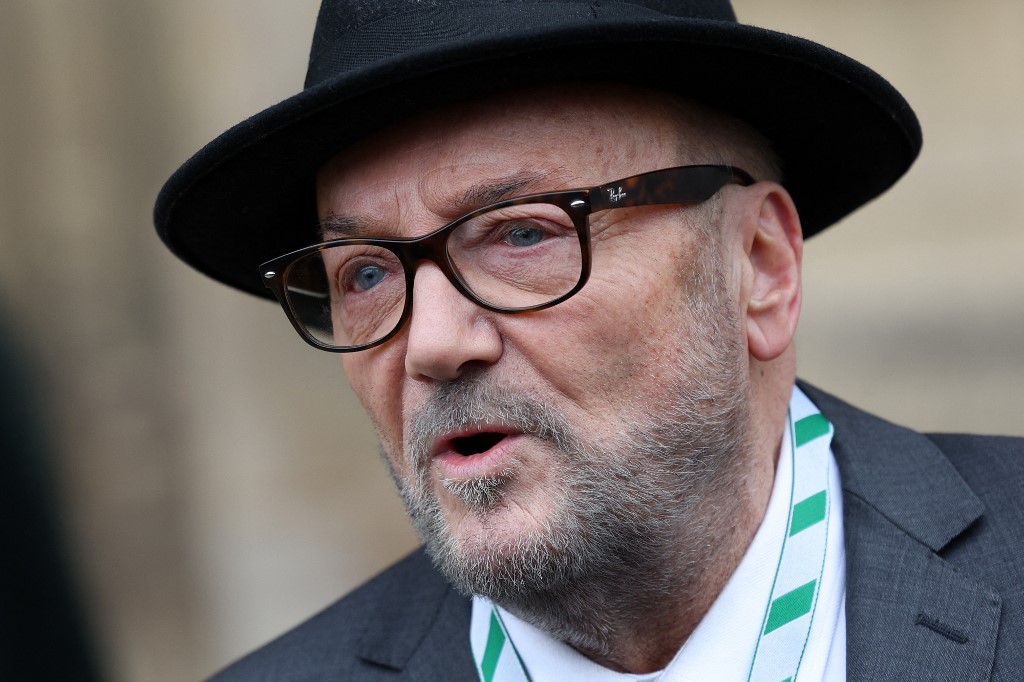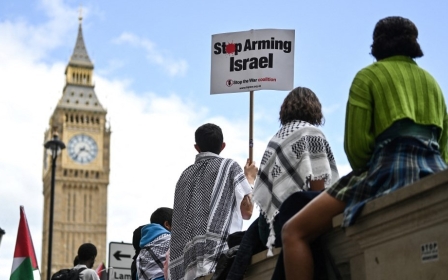UK elections: How Labour lost millions of voters to apathy and a Gaza earthquake

There has been a lot of comment on the Labour victory in the 2024 UK general elections, arguing that it was a "loveless landslide" or a "sandcastle majority", pointing to the yawning gap between the huge numbers of seats won on a very slender proportion of the popular vote.
The discrepancy is indeed striking. Labour’s huge Commons majority rests on a lower popular vote (9.7 million) than Jeremy Corbyn won in the so-called "catastrophic" general election of 2019 (10.2 million). And it is three million votes less than Corbyn won in the 2017 general election (12.8 million).
Even Keir Starmer won fewer votes in his own constituency under his own leadership than he did in both elections when Corbyn was Labour leader.
So where did those missing Labour votes go?
Well, many of them just stayed at home and did not vote at all. So uninspiring was the Labour campaign, the Labour policies so similar to the Tories', that voter turnout slumped to the second lowest since universal suffrage was granted in 1928 - and with it the Labour vote.
New MEE newsletter: Jerusalem Dispatch
Sign up to get the latest insights and analysis on Israel-Palestine, alongside Turkey Unpacked and other MEE newsletters
But that’s not the whole story. In a significant number of cases, voters found a way of voting against the Tories but at the same time voting for candidates who were to the left of Labour, especially on the critical issue of Palestine.
Unusually for a UK general election, a foreign affairs issue significantly altered the result and an extra-parliamentary movement had a direct impact on voter behaviour.
Pro-Palestine candidates
The Green Party, vocal in its calls for a ceasefire in Gaza, won four seats. Previously it had only held Brighton Pavilion, which it successfully defended after the retirement of veteran Green Caroline Lucas. The Greens also took Bristol Central from Labour.
Plaid Cymru took four seats, partly on the back of a vociferous and successful campaign to win the Welsh parliament over to a pro-Palestinian position.
Corbyn was returned as an independent in Islington North, with his majority barely changed, despite a determined and well-organised Labour campaign to unseat him.
Corbyn was joined in the Commons by four other independent MPs, all of whom emerged from the Palestine solidarity movement, and who campaigned over that issue against Labour incumbents. They were returned in Blackburn, Leicester, Birmingham and Dewsbury and Batley.
Beyond this, pro-Palestinian candidates ran a close second to Labour in several important seats. Leanne Mohamad came within a few hundred votes of depriving the new Labour health secretary, Wes Streeting, of his Ilford seat.
Michael Lavalette in Preston took over 21 percent of the vote and came second. Andrew Feinstein was runner-up in Starmer’s constituency. In Birmingham, nearly every contest turned into a run-off between Labour and a pro-Palestine candidate.
In all, there were some 60 left-wing independents of whom nearly half saved their deposits, with many getting strong votes.
Hubris
But not all left-of-Labour candidates were equally successful. The long-existing Trade Unionist and Socialist Coalition (TUSC) stood in 39 seats and lost its deposit in all of them. Its best result was in Coventry, where former Labour MP Dave Nellist got 2.2 percent of the vote, less than the Workers Party of Britain's 2.8 percent.
The Communist Party of Britain (CPB) stood in 14 seats and its best vote share was 1.1 percent.
The Workers Party lost its only MP, George Galloway, who had been elected in the Rochdale byelection in February.
It stood in 155 seats and, although there were some strong results, such as Jody McIntyre’s polling against Jess Phillips in Birmingham, overall only 28 saved their deposit, many by a hair’s breadth.
Those who stood on a standard left platform that they assumed would fit the political moment largely struggled to make an impact, but those who emerged organically from the wider Palestinian solidarity movement were more successful.
The Workers Party - a partial exception to that rule, despite its leader Galloway’s long association with the Palestinian cause - suffered from two difficulties.
Firstly, its loudly voiced insistence that it was "not part of the left", underlined by its conservative "make Britain great" social policies, alienated some on the left without attracting any significant number of working class conservatives who had the Reform party as an option.
Secondly, the hubris that all pro-Palestinian sentiment would be funnelled through its party underestimated the capacity of independent pro-Palestinian candidates and the movement around them to self-organise.
These are important lessons to bear in mind, since they speak very clearly to the necessity of parliamentary representatives remaining very firmly anchored in extra-parliamentary struggles.
Extra-parliamentary struggle
Corbyn is himself a model of this kind of relationship. He has always retained the closest possible links with mass campaigning organisations and with trade union struggles. Now sitting as an independent, he no longer even has to worry about looking over his shoulder at the right-wing Labour leadership - not that there was ever much evidence that he did this even when he was a Labour MP.
Corbyn is a very experienced parliamentarian and the four new MPs elected on a pro-Palestine ticket would do well to act as his "party" in parliament. But they will also need to follow his example of engagement with the extra-parliamentary movement.
Across Europe, we have experienced what happens when radical left parliamentarian parties do not remain embedded in extra-parliamentary struggle.
Syriza in Greece, Die Linke in Germany and Podemos in Spain were all tremendously hopeful electoral projects in their heyday.
Across Europe, and now in the UK, there is one obvious beneficiary if the left fails those who have put their faith in them: the far right
But all became divided when their parliamentary leaders became more accommodating to their political establishments under the pressure of electoral politics, and from an unwillingness to confront the power of the ruling class and the state.
Across Europe, and now in the UK, there is one obvious beneficiary if the left fails those who have put their faith in them: the far right.
To avoid the further rise of the Marine Le Pens and Nigel Farages in the next round of social struggles, the promising victories of Corbyn and the pro-Palestinian candidates in the UK, and of the New Popular Front in France, will need to deliver.
And to deliver, they will need extra-parliamentary struggles if they are to reach new heights.
That is a task from which they cannot shy away; a task they must embrace with bravery and determination.
The views expressed in this article belong to the author and do not necessarily reflect the editorial policy of Middle East Eye.
Middle East Eye delivers independent and unrivalled coverage and analysis of the Middle East, North Africa and beyond. To learn more about republishing this content and the associated fees, please fill out this form. More about MEE can be found here.







